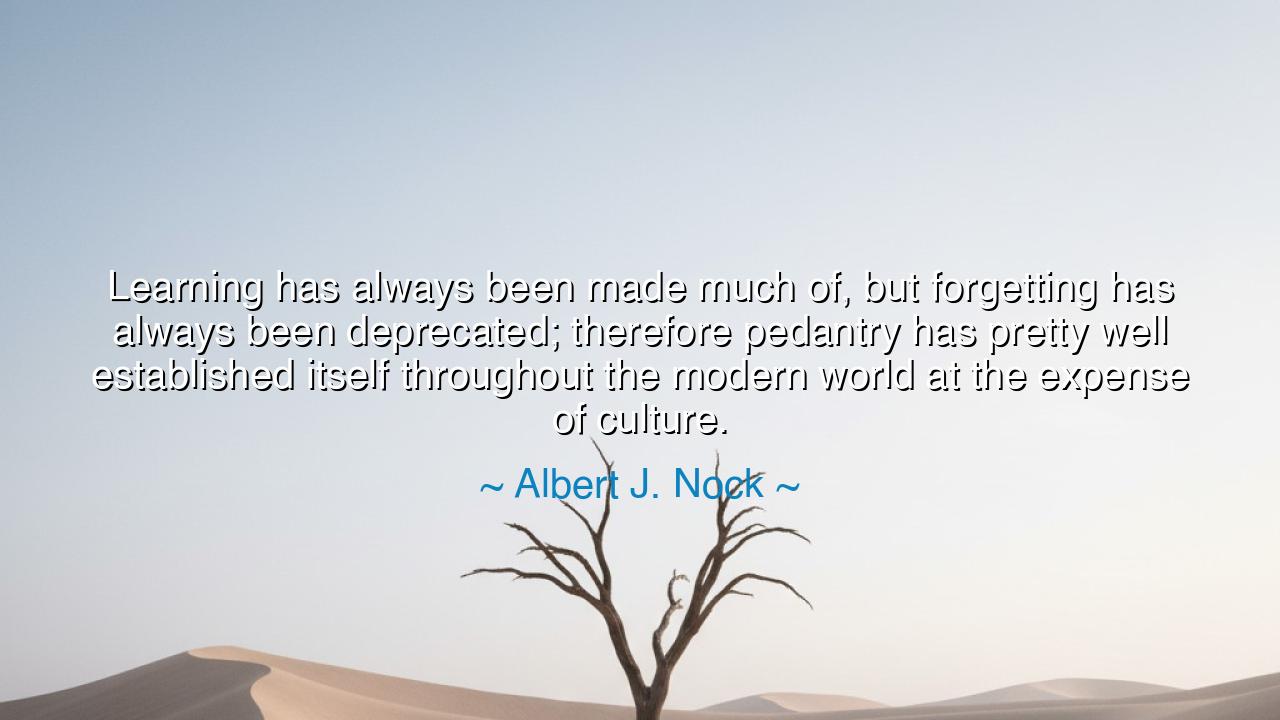
Learning has always been made much of, but forgetting has always
Learning has always been made much of, but forgetting has always been deprecated; therefore pedantry has pretty well established itself throughout the modern world at the expense of culture.






In the councils of the elders, it was said that a wise gardener knows two arts: planting and pruning. Albert J. Nock’s warning—“Learning has always been made much of, but forgetting has always been deprecated; therefore pedantry has pretty well established itself throughout the modern world at the expense of culture.”—names the same law for the mind. We praise accumulation and distrust renunciation, and so our shelves swell while our souls thin. Learning without forgetting is a hoarder’s attic; it creaks with trivia yet yields little room for judgment, taste, or mercy. Culture—the lived harmony of knowledge, value, and form—requires both the sowing of facts and the winnowing of what no longer serves.
To honor forgetting is not to love ignorance; it is to love selection. As a sculptor frees a figure by removing marble, so a thinker frees meaning by letting go. The ancients practiced this in memory palaces that were also gardens: they added paths only to trim them, keeping what bore fruit. When forgetting is deprecated, we dare not discard; we pile citation upon citation, footnote upon footnote, until pedantry—the worship of detail without proportion—crowds out wisdom’s clear air. What Nock laments is not scholarship, but scholarship unhumbled by purpose.
Consider Michelangelo before the unpromising block that became David. He did not add stone; he subtracted. His genius lay as much in refusal as in skill—refusing distractions in the vein, refusing every chip that blunted the gaze he sought. This is the mind’s pruning made visible: the art of saying, “Not that,” until the essence stands forth. So too with letters and laws, rituals and curricula: the most humane institutions are those that remember to forget—retiring forms that no longer shelter life so that culture can breathe.
A second witness speaks from the narrow road of poetry. Matsuo Bashō taught his students to cut until the poem walked lightly enough to cross a stream on a single reed. He prized the phrase that opened a world and scorned the pile that closed it. In this school, learning gave you a thousand images; forgetting chose the one that carried dawn. When we neglect this discipline, we produce catalogs, not poems; when our schools neglect it, we graduate technicians of citation who cannot choose which tool is fit for a given human hour.
History also shows the peril Nock names. Late scholasticism, glorious in its rigor, sometimes mistook clever disputation for truth’s nourishment. Whole forests of commentary grew around questions whose roots no longer touched water. The Renaissance did not triumph by rejecting learning, but by curating it—by forgetting in order to remember better. They kept Euclid and cast off needless gloss; they kept virtue and corrected vanity. Where pedantry ruled, conversation stiffened; where wise forgetting returned, culture flowered.
From this, take a clear lesson: knowledge must be composted as well as collected. Make room. Let obsolete categories die so that living understanding can feed on their remains. Ask of every method, rule, and canon: does it still bear fruit in human lives? If not, thank it—and set it down. The mark of maturity is not how much we can recite, but how precisely we can choose, how swiftly we can clear space for what matters.
Let counsel become practice. Keep a “scholar’s knife”: after gathering notes, strike through anything that does not serve the question. Build syllabi and meetings with a “stop list” as carefully as a reading list. In conversation, trade performative references for generous explanations. Each season, unlearn one habit of thought that no longer helps—an old bias, an inherited jargon, a metric that measures nothing worth measuring. And in your home, as in your head, tidy the shelves: keep the few books that changed you and give away the ones that only congratulated you. Do these things, and you will hear Nock’s grief turn into guidance: learning restored to partnership with forgetting, culture restored to breadth and depth, and the mind once more a tended garden where judgment grows tall in the open light.






AAdministratorAdministrator
Welcome, honored guests. Please leave a comment, we will respond soon